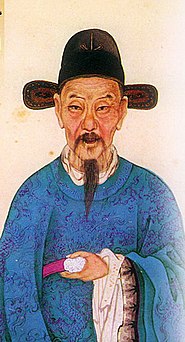Zhang Juzheng
| Zhang Juzheng | |
|---|---|
 |
|
| 47th Senior Grand Secretary of the Ming Dynasty | |
|
In office 1572-1582 |
|
| Monarch |
Longqing Emperor Wanli Emperor |
| Preceded by | Gao Gong |
| Succeeded by | Zhang Siwei |
| Personal details | |
| Born | 1525 |
| Died | 1582 (aged 57) |
| Zhang Juzheng | |||||||||||
| Traditional Chinese | 張居正 | ||||||||||
|---|---|---|---|---|---|---|---|---|---|---|---|
| Simplified Chinese | 张居正 | ||||||||||
|
|||||||||||
| Transcriptions | |
|---|---|
| Standard Mandarin | |
| Hanyu Pinyin | Zhāng Jūzhèng |
| Wade–Giles | Chang1 Chü1-cheng4 |
| IPA | [ʈʂáŋ tɕýʈʂə̂ŋ] |
Zhang Juzheng (Chinese: 張居正; 1525–1582), courtesy name Shuda (叔大), pseudonym Taiyue (太岳), was a Chinese reformer and statesman who served as Grand Secretary (Shǒufǔ) in the late Ming dynasty during the reigns of the Longqing and Wanli emperors. He represented what might be termed the "new Legalism" aiming to ensure that the gentry worked for the state. Alluding to performance evaluations, he said "Everyone is talking about real responsibility, but without a clear reward and punishment system, who is going to risk life and hardship for the country?" One of his chief goals was to reform the gentry and rationalize the bureaucracy together with his political rival Gao Gong, who was concerned that offices were providing income with little responsibility. Taking the Emperor Hongwu as his standard and ruling as de facto Prime Minister, Zhang's true historical significance comes from his centralization of existing reforms, positing the reformative agency of the state over that of the gentry - the "Legalist" idea of the sovereignty of the state.
The Wanli Emperor deeply respected Zhang as a mentor and valued minister. During the first ten years of the Wanli era, the Ming dynasty's economy and military power prospered in a way not seen since the Yongle Emperor and the Rule of Ren and Xuan from 1402 to 1435. However, after Zhang's death, the Wanli Emperor felt free to act independently, and reversed many of Zhang's administrative improvements.
Zhang Juzheng was born in Jiangling County, in modern-day Jingzhou, Hubei province, in 1525, and was renowned for his intelligence at an early age, passing the county shengyuan examinations at the age of 12 and enrolling for the provincial juren examinations the next year, where the chief examiner failed him to prevent his becoming complacent. Finally, in 1547, he passed the imperial examination and was appointed as an editor in the Hanlin Academy.
...
Wikipedia
